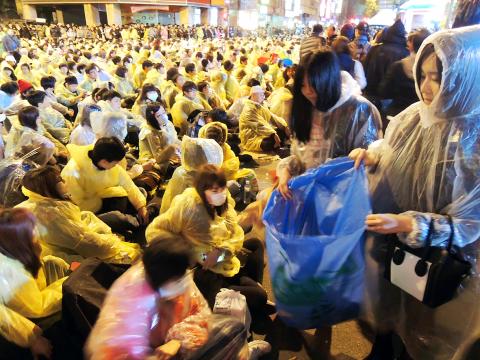Hundreds of students surprised the nation on Tuesday night when they broke off from an overnight sit-in and occupied the legislature in protest against the Chinese Nationalist Party (KMT) caucus’ handling of the cross-strait service trade pact.
After successfully fending off several evacuation attempts by the police and garnering national support over the past five days, the protest, which the media have dubbed the “Sunflower movement” — the largest student movement since the Wild Lily movement in 1990 that propelled legislative reform.
There are skeptics questioning almost everything about the group of young people — from their storming of the legislative compound and drinking beer in the legislative chamber, to their connections with opposition parties and their knowledge about the trade pact.

Photo: Hsieh Wen-hua, Taipei Times
In particular, there have been many questions about the cause and sustainability of the movement.
The students have been responding to these queries on an hourly basis.
In the legislature and the rallies outside the Legislative Yuan compound, students organized into groups to clean graffiti from the walls, recycle trash and maintain order.
Set up like a well-trained army unit, the students were divided into various teams of logistics, communication, patrol and — with help from volunteer physicians and lawyers — a medical team and a legal team were quickly assembled.
That was partly because the leaders of the movement, National Taiwan University graduate student Lin Fei-fan (林飛帆) and National Tsing Hua University student Chen Wei-ting (陳為廷), as well as other members of the core leadership are seasoned veterans in social movements despite their youth.
They gained experience from numerous protests in the past two years, including the one against land seizures at Miaoli County’s Dapu Borough (大埔) and the construction of the Miramar resort in Taitung County, the campaign against media monopolization and the anti-nuclear movement.
Well aware of the nation’s political situation, the students have distanced themselves from political parties and stayed away from the so-called “blue-green struggle.”
Quite contrary to what several local media outlets and the KMT portray, most of the students in those protests have been able to explain their cause clearly and stand firmly for what they believed in.
The “Sunflower movement” is more than an overnight phenomenon and should be interpreted beyond these young people’s discontent with President Ma Ying-jeou’s (馬英九) governance.
It is the cultivation of the students’ effort in the past two years, during which they defied conventional views about the younger generation — that they could not care less about politics and the world they live in — and showed Taiwanese that they do care and they would take action to make the country a better place — any time and anywhere.
If today’s group of young activists have learned from what happened to the “Wild Lily generation,” some of them are more than likely to become the backbone of Taiwanese politics and social movements in the next 10 years.
From what people have seen so far, the new young activists show a deep caring for the nation and for the purity of politics as it was in the early 1990s.

Chinese Nationalist Party (KMT) Chairman Eric Chu (朱立倫), spokeswoman Yang Chih-yu (楊智伃) and Legislator Hsieh Lung-chieh (謝龍介) would be summoned by police for questioning for leading an illegal assembly on Thursday evening last week, Minister of the Interior Liu Shyh-fang (劉世芳) said today. The three KMT officials led an assembly outside the Taipei City Prosecutors’ Office, a restricted area where public assembly is not allowed, protesting the questioning of several KMT staff and searches of KMT headquarters and offices in a recall petition forgery case. Chu, Yang and Hsieh are all suspected of contravening the Assembly and Parade Act (集會遊行法) by holding

PRAISE: Japanese visitor Takashi Kubota said the Taiwanese temple architecture images showcased in the AI Art Gallery were the most impressive displays he saw Taiwan does not have an official pavilion at the World Expo in Osaka, Japan, because of its diplomatic predicament, but the government-backed Tech World pavilion is drawing interest with its unique recreations of works by Taiwanese artists. The pavilion features an artificial intelligence (AI)-based art gallery showcasing works of famous Taiwanese artists from the Japanese colonial period using innovative technologies. Among its main simulated displays are Eastern gouache paintings by Chen Chin (陳進), Lin Yu-shan (林玉山) and Kuo Hsueh-hu (郭雪湖), who were the three young Taiwanese painters selected for the East Asian Painting exhibition in 1927. Gouache is a water-based

Taiwan would welcome the return of Honduras as a diplomatic ally if its next president decides to make such a move, Minister of Foreign Affairs Lin Chia-lung (林佳龍) said yesterday. “Of course, we would welcome Honduras if they want to restore diplomatic ties with Taiwan after their elections,” Lin said at a meeting of the legislature’s Foreign Affairs and National Defense Committee, when asked to comment on statements made by two of the three Honduran presidential candidates during the presidential campaign in the Central American country. Taiwan is paying close attention to the region as a whole in the wake of a

OFF-TARGET: More than 30,000 participants were expected to take part in the Games next month, but only 6,550 foreign and 19,400 Taiwanese athletes have registered Taipei city councilors yesterday blasted the organizers of next month’s World Masters Games over sudden timetable and venue changes, which they said have caused thousands of participants to back out of the international sporting event, among other organizational issues. They also cited visa delays and political interference by China as reasons many foreign athletes are requesting refunds for the event, to be held from May 17 to 30. Jointly organized by the Taipei and New Taipei City governments, the games have been rocked by numerous controversies since preparations began in 2020. Taipei City Councilor Lin Yen-feng (林延鳳) said yesterday that new measures by